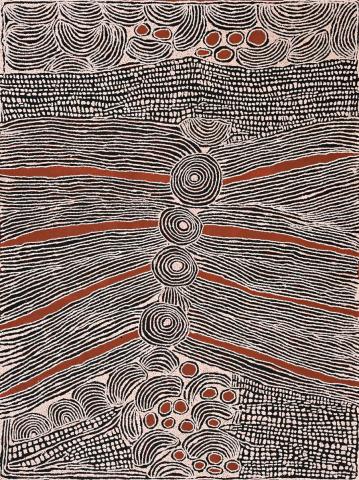WOMEN AT WIRRULNGA, 2005
NINGURA NAPURRULA
synthetic polymer paint on linen
244.0 x 183.0 cm
inscribed verso: artist's name, size and Papunya Tula Artists Pty Ltd catalogue number NN0510101
Papunya Tula Artists Pty Ltd, Alice Springs
Suzanne O’Connell Gallery, Brisbane (label attached verso)
Private collection, Queensland
This painting is accompanied by a certificate of authenticity from Papunya Tula Artists Pty Ltd, Alice Springs
Ningura Napurrula was born at Watulka, south of the Kiwirrkura Community in Western Australia. She was the wife of the late Yala Yala Gibbs Tjiungurrayi, a renowned Pintupi artist and one of the original Papunya painting men.
Napurrula first painted in 1995 during the second year of the Haasts Bluff/Kintore Women's painting camp. Napurrula produced her first canvas in 1996 and today her work is held within Australia and internationally in a number of significant public collections, including the Art Gallery of New South Wales.
In 2003 Napurrula with four other artists was chosen to have a work depicted on an Australian Post postal stamp. In 2004 she was selected as one of only eight Aboriginal artists to have her work included within the architectural design of the Museé du quai Branly, Paris.
The roundels in this painting represent Wirrulnga, a rockhole site east of the Kiwirrkura Community in Western Australia. Napaltjarri and Napurrula kinship women are linked to this site, which is associated with birth. The artist depicts the journey and the sacred sites of her Ancestors. Pregnant women are represented by the lines next to the roundels. Rocky outcrops and sand hills are shown as grids and crescent shapes, respectively. At this site, women create hair-string skirts to wear during ceremonies. The smaller roundels represent the berries collected by the women as they travelled north east to Wilkinkarra.
